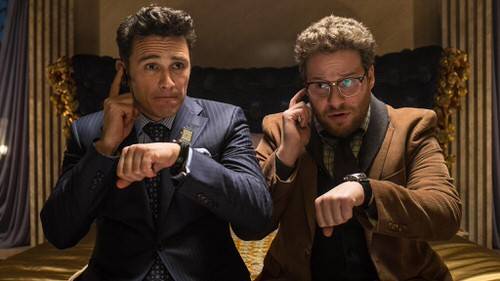
North Korea goofed. By attacking and threatening Sony until it yanked its Seth Rogen film, The Interview, the nation-state turned a minor, hare-brained movie into a cause for freedom and anti-terrorism that everyone now wants to see.
Some wacky schemes for alternative distribution have started coming out of the woodwork. A BitTorrent spokesperson, trying to goad Sony Pictures Entertainment into distributing the video on its file-sharing platform, said it’s the “best way for Sony to take back control of their film.”
See also: U.S. Intelligence Implicates North Korea In Sony Hack
Another idea has the U.S. government buying the rights and releasing it online directly. A North Korean defector even wants to send the movie into his former homeland via balloons.
The method of distribution may not be evident, but one thing seems crystal clear: This movie’s not dead yet.
A Torrential Affair Could Make Strange Bedfellows

Rogen and James Franco must be shocked to find themselves unwitting poster boys for freedom. They’d be even more surprised to learn all the wacky ways people want to send their flick out into the wild. Across the political spectrum, everyone from George Clooney to the Wall Street Journal’s edit page thinks The Interview ought to be set free online.
Doing so via BitTorrent would be a striking move. Hollywood studios hate torrenting, since it tends to fuel piracy of movies, music, games and software. The peer-to-peer file-sharing system pulls data from different computers and servers before stitching them together. With no single source, it’s tough to pin down.
But what made it a slippery piracy tool could work in the movie studio’s favor, in this case.
See also: FBI Warns Of Malicious Software Following Sony Attack
BitTorrent has been trying to remake its image, going after artists and other clients who need some form of legitimate file distribution. Partnering with Sony to strike back against terrorism would do wonders for its credibility.
The representative outlined just how the would-be partner could use the platform:
“Bundle has a self-publishing platform that anyone from Sony can use: https://bundles.bittorrent.com/publish. Using the paygate option, Sony are able to set the price for the film and release it widely without implicating anyone or exposing any third party to a terrorist threat.”
If Sony Won’t Do It, Maybe Obama Should

Given the way Sony caved so completely to terrorist threats that may or may not be real (denying, of course, that it was caving all the way), it may not want to put its name on any distribution mechanism. So the Wall Street Journal’s editorial board thinks the U.S. should.
President Obama made his disappointment with Sony plain, saying the studio “made a mistake” by caving in and pulling the movie. But it’s not as simple as that. Even though Sony says it backed off because the major theaters cancelled, it’s hard to overlook the fact that Sony Pictures is a branch of Sony Corporation, one of the biggest conglomerates in Japan—a country with its own tense relations with Pyongyang.
Either way, the POTUS wants to go where Sony feared to tread, promising some sort of response from the U.S.
The WSJ editors think it should involve the federal government buying the movie rights and releasing the film online itself. With confirmation of North Korea’s involvement in hand, thanks to the Federal Bureau of Investigations, the president may even feel justified doing it.
The move would be pretty cheap too. If the U.S. foots the bill for the film’s whole production cost, that $44 million expense still comes in far below the $6 trillion spent on the wars in Afghanistan and Iraq—making for the cheapest and easiest counterstrike to terrorism ever. Making it free would guarantee an enormous viewership.
Not Caving
Of course, the one audience left out of that online blitz would be North Korea’s own people. The dictatorship keeps tight control over the news and entertainment permitted to reach its citizenry.
One former North Korean says he knows how to breach that echo chamber: Park Sang Hak, a defector living in South Korea, already sends balloons north with USB drives filled with films, TV shows and other videos about life outside the Hermit Kingdom. He’s a thorn in the side of Kim Jong Un’s regime, which considers him “Enemy Zero” and has already tried to assassinate him.

In a plot fit for a movie, Park says he wants to load the memory sticks with The Interview, sending Seth Rogen’s high jinks right into Pyongyang’s front yard.
Sony previously said it had no plans to release the movie. Then Sony Entertainment CEO Michael Lynton appeared on CNN on Friday, defending his company by telling Fareed Zakaria it did not “cave.” The same day, Sony issued a statement saying the company had been “actively surveying alternatives to enable us to release the movie on a different platform.
“It is still our hope that anyone who wants to see this movie will get the opportunity to do so,” the statement read.
That will probably happen. Because if Sony can’t do it, at least a lot of others appear to be working on it.
Lead photo courtesy of Shutterstock; balloon photo by Shaun Fisher; all others courtesy of Sony Picgtures Entertainment

















